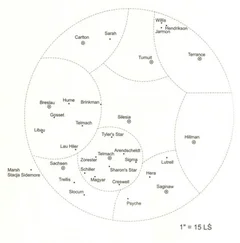That "payoff" mentality was probably unnecessary, since the notion of a Mesan Anti-Slavery League boggled the mind, but it was indicative of the fundamental paranoia which the institution of slavery bred in its slaveowner class. That paranoia also extended itself—with considerably greater justification—to suspicion of outside "troublemakers." While free Mesan citizens enjoyed relatively high degrees of civil liberty, there were specific areas in which those liberties were extremely restricted. The security organs of Mesa enjoyed virtually carte blanche authority in any matter impinging upon the institution of slavery, and they were ruthless in the extreme with any suspected abolitionist. The majority of Mesan citizens had no objection to this, since they, like their corporate overlords, lived in fear of the specter of servile rebellion and generally supported any measure they believed would make that rebellion less likely.
What all that meant, however, was that the formally democratic aspects of Mesa's governmental structure were basically just that—formalities. That was quite unlike the situation on Beowulf, where the population as a whole—that is to say, its citizens— had final control of the government.
While Web had been ruminating, the rest of the people in the room had kept silent. Partly out of personal respect, and partly for the practical reason that Du Havel was Torch's prime minister. If any decisions were to be made today, he'd have to be in favor of them.
"I don't fundamentally disagree with your assessment, Victor. Or yours, Anton. I could quibble here and there, but that's what they'd be. Quibbles."
"Right, then," said Jeremy. He took a seat next to Berry. The other people in the room recognized the signs—symptoms, you could almost say. Jeremy X was ready to start making decisions. "What do we do?"
" We don't do anything—if by 'we' you're including Torch or the Ballroom," Anton replied. "We've already agreed that Mesa's gotten agents here. So we have to start small and . . . call it 'quarantined.' "
"Who, exactly, is 'we,' then?" asked Du Havel.
"Initially, just three of us." Anton jabbed a thumb at his chest, and then pointed to Victor and Ruth. "Me. Him. Her. It's the only way we can be sure we're completely evading any Mesan double agents. And then, if and when we need backup, we'll use Ganny Butre and her people."
"And just how do you propose to get into Mesa?" Jeremy demanded. "Or I should say, vanishing from sight once you do. There's no way you'll be able to do that without using at least some of the Ballroom's contacts on Mesa."
He cocked his head. "So. How exactly do you plan to get around that problem?"
"By using one member of the Ballroom as our liaison, and one only. Saburo. He knows a number of Ballroom contacts on Mesa and"—Zilwicki's jaws tightened—"given what happened to Lara, we figure he's as trustworthy as anyone this side of Whatever Saints Might Be."
Jeremy pondered the matter, for a moment, and then nodded. "Good plan, I think. I assume you'll leave Saburo behind, though, when you do the actual penetration?"
"Oh, yes," said Victor. "Trying to smuggle him into Mesa would be an order of magnitude harder than smuggling ourselves in. The one thing that Mesan police forces watch for like hawks is any attempt by ex-slaves to penetrate their security."
"True enough. For you and Anton, though, the real trick will be vanishing once you get onto the planet." He smiled. "And do please note that I'm not asking you how you plan to do that."
They smiled back. And said nothing.
Web didn't even try to figure out the espionage technicalities. He was far more intrigued by another issue. "Leave aside security," he said. "Am I the only one here who thinks it's downright weird that you propose to form an elite corps—no more than three of you; four, if you count Saburo—of secret agents, made up of Manticorans and Havenites?"
Berry grinned. "It is weird, isn't it? Given that they're officially at war with each other."
"Technically, I've got dual citizenship now," said Ruth stoutly. "So I figure I count as a citizen of Torch, not a Manticoran."
That claim was . . . dubious. To begin with, while Torch recognized dual citizenship, the Star Kingdom didn't. Not for anyone, much less a member of its own royal house. Granted, under the circumstances, the Manticoran government had been willing to look the other way when Ruth took out Torch citizenship. Leaving that aside, nobody in their right mind—and certainly not Victor Cachat—doubted for a moment that Ruth would never act against Manticore's interests.
Cachat looked uncomfortable. Zilwicki, on the other hand, seemed quite relaxed. "We can chew on the legalities until the heat death of the universe. What matters,though, is that if we're right, then Manpower and Mesa are engaged in a lot deeper game than we thought they were. And whatever else may be true, the one thing that's sure and certain is that their intentions will be hostile in the extreme toward both Haven and Manticore."
Victor spoke up. "Which means that whatever we uncover, we're going to have to share it and—what's almost certainly going to be the biggest problem of all—convince both Haven and Manticore that our assessment is accurate. There will be no way to do that without both Anton and me being involved from beginning to end."
"I can see that," said Jeremy, nodding. "But . . . ah, I hate to remind another person of his duty, Victor, but I thought you were the head of Haven's intelligence not only here on Torch but also on Erewhon. 'Chief of station,' I think it's called."
Victor looked uncomfortable again. "Well . . . yes. But there's a lot of latitude involved." More brightly: "And they've sent out a very competent subordinate. I'm sure she can handle things while I'm gone."
"And just how can you be so certain she's that good?"
"Oh, we've worked together before, Jeremy, on La Martine. She did a superb job of organizing the murder of a rogue StateSec officer, and handled the beating I gave her afterward just about as well." Seeing the stares, he added: "Well, I had to have her beaten. Only way to cover her tracks. I learned that from Kevin Usher, the time he beat me to a pulp in Chicago."
He rose from the table. "And now that we're settled on our course of action—even though most of you don't actually know what it is—I've got to start planning our entry into Mesa. Anton and Ruth still have a lot of data-crunching to do, but they don't really need my help. That sort of thing is, ah, not my forte."
Du Havel saw that Berry was now looking cross-eyed. It was hard not to laugh. He was quite sure he knew what the young queen was thinking.
Sure isn't. Victor Cachat's forte is mayhem.
"Are you sure about this, Victor?" asked Jeremy. "It's a hell of risky way for you to try to get onto Mesa."
He gave Victor's companion a glance that was not quite skeptical, but close. "And—meaning no offense, Yana—but adding you to this small team seems to me to increase the risk, not lower it."
The ex-Scrag Amazon gave the war secretary a cool smile in return. A bit hastily, he added: "Not because I doubt your loyalties, you understand. It's just . . ."
He chuckled softly. "I will say, Victor, if you pull this off you'll have raised the bar for chutzpah about a meter."
"Who Hutspa?" asked Berry.
"Miguel Jutspa," said Ruth. "Spelled with a 'J,' not an 'H.' He's a leader of the Renaissance League, one of Jessica Stein's close advisers."
Web Du Havel smiled. "I think Anton's actually using a Yiddish term, Ruth."
"What's—"
"Ancient dialect of German used by Jews. 'Chutzpah'—it actually starts with a 'ch'—means . . ." His eyes got a little unfocused. "There's no exact translation. It's a wonderful term, really. The closest would be brazen, brash—but with the connotation of breath-taking self-righteousness as well. A good illustration is the old joke about the man who murdered his parents for the inheritance and then, when caught and convicted, argued that he should get a light sentence because he'd been deprived of parental guidance. That's chutzpah. "
Читать дальше












